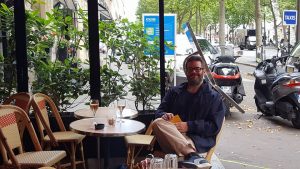We are sitting outside at a café in Paris’ Latin Quarter. I am pinned between our table and the wall, so I am watching people walk by. We’ve been seated exceptionally close to two young men who smoke cigarettes while they eat. They speak in French. An English copy of The Grapes of Wrath is on the table.
The waitress gives us menus and my sister orders water and white wine in French. Her French sounds great to me, but the waitress makes a few faces during their exchange which would suggest that she was either judgmental of my sister’s French or had a pregnant black widow in her panties.
She leaves. My sister and I are enthusiastic and happy, but we are also nervous. For the first time in a very long time, I feel intimidated. The waitress doesn’t seem to suffer fools, and I am certain I have made a fool of myself thus far and this lunch is not nearly over. It has been a long time since I have had absolutely no idea of what was being said. I speak pretty good Czech. I understand German. In other places they engaged me in English.
Not in Paris. I said “Merci” when the waitress said “Bonjour.” I have since smiled at her idiotically while begging her not to engage me in any sort of conversation. I look at the menu and understand nothing. I scan for familiar foods. Eggs. Salmon. Salad. Cognac. That’s about it. I need help and so I politely ask my sister.
“Translate, Verb Monkey!”
The look I get is one I have not seen since I tied a pillowcase around her neck and encouraged her to jump off the top step. I make up my mind to order the first thing I see that has no mushrooms and is cheaper than 20 Euro.
“Is that mushrooms?” I point.
She looks. “No.”
“Is that mushrooms?”
“No.”
“Is that mushrooms?”
“The word for mushrooms is ‘champignons’ (pr: shhhamblahblahahaaaaaa),” she says.
“OK…Is that mushrooms?”
I am spared a fork to the esophagus by the arrival of the waitress. My sister orders and the waitress bounces her head in judgment before deciding to allow Julia’s French to slide. I point to one thing I recognized at the last-minute: foie gras.
She nods. Disappears.
My sister and I start guzzling the wine. In the sixty minutes I have been in Paris, one thing has been made clear: I don’t belong here. Everyone looks and acts as if they have just had sex. They are smoking, beautifully disheveled, engage one another in a post-coital calm. My sister Julia, who has a decent handle on the language, is more at ease than I am.
I am in trouble. Moreover, I am embroiled in an existential crisis:
You see, I thought I was European.
But I am not.
I have been living in Prague for 11 years. I speak Czech well enough, understand most of what’s said, and, most importantly, I know how to be Czech. I can blend into a crowd of Czechs as if I belong there. I know the facial expressions, reactions, and demeanor of a typical Czech. Don me in socks and sandals, a fanny pack, and a denim jacket and you’ll never know I’m not Czech. I know the social etiquette that every Czech person follows when they walk in a room, order a drink, order food, get on a tram. Everything. I studied it as an outsider until I was an insider.
I have taken great joys in watching outsider Americans make the common mistakes of those not familiar with Czech culture. This joy has been enhanced by sharing it with nearby Czechs. After watching an Italian guy pick up a bread dumpling and dip into guláš, a waiter and I chuckled to each other through horror-stricken faces. An American tourist once asked Collin and I to help him order a sauce-based meal with no sauce. The waiter made a side joke to us about annoying Americans and all three of us laughed. We all laughed again as the glum-faced American nibbled in disappointment on the two little flat steaks, knowing he had brought this all on himself. On these and many other occasions, it’s felt good to be on the inside.
Now I blend in. There.
For some reason (read: a disturbing lack of self-awareness and a dangerously tentative grasp on reality) I thought this insider knowledge would carry over into other European states. I get to say that I live in Europe and that makes Americans swoon. I do, after all, have an EU permanent residency card, and if that doesn’t allow me an immediate and inherent understanding all of the EU nations’ languages and social customs then someone needs to answer to that. Preferably, in English.
In Paris I stand out like a sore pouce. As if I needed further example of that, my foie gras arrives. I have no idea how to eat this. It’s two pale bricks of goose liver flanked by an orange marmalade substance. There are three pieces of toast and fresh bread on the table. I slab a bit of the foie gras on the toast and add some marmalade. I bite into it. Julia accidentally ordered a party platter of cold meats.
The two young men glance over and then share a visual, wordless conversation. Their eyes call me a buffoon and several of its synonyms. Another couple gazes at me in confused horror. The way I might if someone ate a cheeseburger with a spoon or picked up a dumpling and dipped it into guláš.
Damn poetic justice.
A passing Japanese family eye me with a curious blend of fascination and disgust. In my paranoia, I feel that they share a giggle with the waitress and the other diners.
Maybe they live here.



#1 by Hanky on August 4, 2016 - 8:23 pm
I once saw an American in a hostel in Budapest who peeled her breakfast Camembert. 🙁